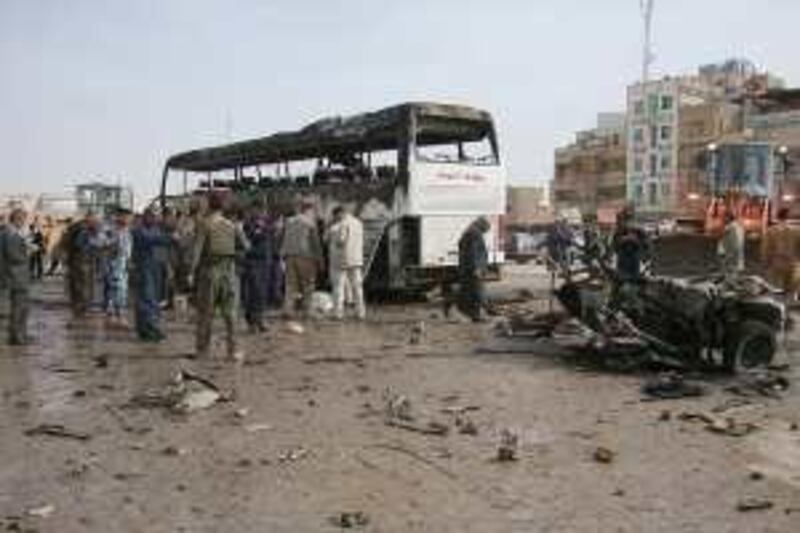BAGHDAD // Iraq votes today in what is being seen as a critical election for the future of the country and for the wider Middle East. The ballot has already been tainted by allegations of fraud, intimidation and incomplete registration lists, which are believed to have affected thousands of security personnel involved in early voting. Violence has also cast its shadow. Yesterday, a car bomb killed four Iranian pilgrims and wounded more than 50 other people, just a few hundred metres from the Imam Ali shrine in Najaf, one of the holiest sites in Shiite Islam and an area that was believed to be safe.
At least 49 people have been killed in the last days of campaigning, including soldiers and police officers on their way to polling stations. Al Qa'eda in Iraq yesterday issued a warning that anyone turning out to vote ran the risk of being killed in planned attacks. Such details underline the exceptional circumstances in which today's national elections, the second since Saddam Hussein's removal from power in 2003, are taking place.
Despite significant security gains, Iraq remains dangerous. It also remains a politically divided, impoverished country, policed with the help of almost 100,000 American soldiers. US combat troops are not due to withdraw until August, a schedule that Iraqi and US leaders say may yet slip. The election campaign has seen a return to unashamedly sectarian themes, with a heavy emphasis on personalities over policy.
Substantial policy debate between the main contenders has been virtually non-existent. All espouse Iraqi nationalism, promise to improve security, fight rampant corruption and to accelerate reconstruction, without offering details of how these goals can be achieved. "We have not seen any real discussion of policy, no strategy, and that means it's not clear what direction Iraq will head in after these elections," said Ammar Allawi, an independent Iraqi political analyst.
"What we have seen is a lot of propaganda and manoeuvring by all sides trying to win. The only policy is victory." To some extent - exactly how much remains unclear - the election has been shaped around a struggle between outside influences over Iraq; the United States on one hand and neighbouring Iran on the other. In the absence of reliable, independent opinion polls and given that there is no clear election front-runner, it is difficult to judge how Iraq as a nation will vote. Prime minister Nouri al Maliki, head of the State of Law coalition, is expected to perform well, as is former prime minister Ayad Allawi, head of the secular Iraqiyya list, a likely recipient of support from many of the Sunni Arabs who boycotted the last election but who are taking part this time.
The Iraqi National Alliance, a Shiite sectarian bloc containing the Islamic Supreme Council of Iraq (ISCI) and the Sadr movement should also collect significant support. As such it seems inevitable that no single group can win an absolute majority, meaning the next prime minister will be chosen by a cross-party parliamentary coalition. The negotiation process involved in that kind of deal-making can take months.
A National Media Centre survey said 63 per cent of Iraq's 19 million registered voters were likely to cast ballots. There are clear signs that the post-voting period will be difficult, with parties already levelling allegations of misconduct against each other and warning that any efforts by one group to steal the election could result in renewed violent uprisings. "We have reason to believe that al Maliki [the prime minister] has been trying to buy votes and force people to support him," said Rasim al Marwani, an official with the Sadr movement. "If after the election we did not win despite our large support and if there is proof Maliki cheated then we will stand strongly against him using whatever means necessary."
Nisreen al Damenouji, a spokesperson for the Iraqiyya list, said it would raise claims of intimidation against their supporters to electoral officials. "If there is cheating it will be terrible for Iraq," she said. "If there is not an understanding that partnership and compromises are needed, we will see a return to armed conflict between the political groups. That would be the worst outcome." Another challenge is likely to present itself because the next Iraqi parliament will be governed under a different set of rules, including the condition that the president no longer need be chosen with a two-thirds majority. That could bring an end to the tidy yet controversial three way split between Sunni Arab, Shiite Arab and Kurd in forming the powerful presidency council.
It is a change that may help push a united Iraq past its ethno-sectarian identity crisis or, at the other extreme, it could serve to increase ethno-sectarian divisions. If divisions are to increase, Kirkuk will play a major role. There has been no election in the oil rich city since 2005 because of disagreements over power sharing. Today it will be the scene of one of Iraq's key election battles. Kurds are squaring off against nationalist Arabs and Turkomen, both sides looking to cement their respective claims over the contested city.
@Email:nlatif@thenational.ae psands@thenational.ae





